Coursera Revolution: How MOOCs Are Transforming Global Education
Over the past ten years, the online education sector has seen substantial expansion. Who would have imagined that we would be able to study online from the convenience of our homes just a few years ago? It was a peculiar idea!
The market for online education was estimated to be worth $254.80 billion in 2021, and by 2027, it is anticipated to grow to $605.40 billion. That implies that the expansion of this sector in the years to come is not expected to slow down.
Even though there have been discussions about online education platforms for more than ten years, they have all experienced significant development since the epidemic. Udemy, Khan Academy, Coursera, and many other similar apps are now well-known because they provide access to education anywhere and at any time.
Early this decade saw the creation of the app Coursera, which is now valued at $5 billion on the market. But how did it become so successful and leave its mark in the fiercely cutthroat field of online education?
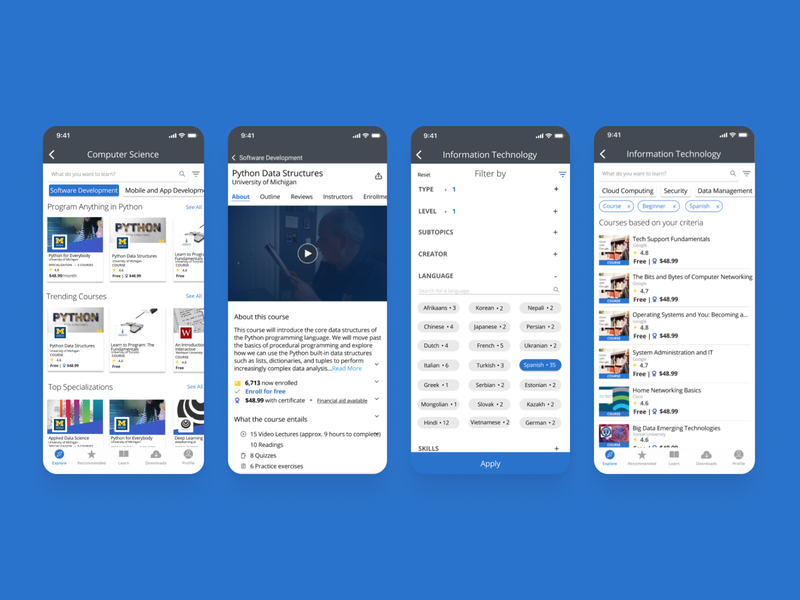
In this article, we'll investigate the Coursera Business Model to discover the answer to the same query. So let's get going.
The Inspiring Success Story of Coursera: Unrestricted Learning
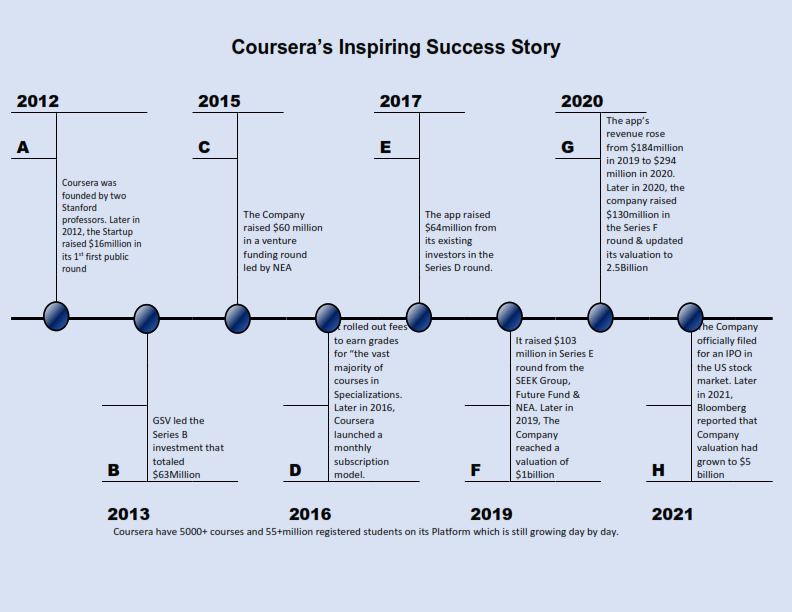
Professors Daphne Koller and Andrew Ng from Stanford University created the Coursera app. They were close friends who both loved technology and learning about computers. They had the idea to launch an online education platform at the beginning of 2012 to pursue their passion, and the rest is history.
They developed their platform, drawing inspiration from Udacity, and made their self-taught course "Machine Learning" accessible so that everyone could use it and understand the technique. Overnight, students from all around the world began signing up for their courses and platforms. Within a few days, more than 104,000 pupils registered for it.
The entrepreneurs had all the proof they needed to scale their freshly developed application thanks to this wild enthusiasm and $16 million in backing from New Enterprise Associates and Kleiner Perkins. They gave up their careers at Stanford and worked incredibly hard to develop Coursera.
No matter to which community a person belongs, they have always been driven by the passion to provide the best education possible. They collaborated with prestigious universities around the globe, including the University of Pennsylvania, Princeton, Stanford, and Michigan.
But by 2016, the site's two founders had left to start their own business, and new executives had been hired to help the platform grow. Since Jeff Maggioncalda took over as CEO in 2017, the business has never had a difficult day. To scale the application and commercial operations, Coursera continued to offer more courses, students, and income streams in the years following 2017.
Then there was a pandemic, and since the online education sector benefited from it, its expansion was accelerated at that time. In 2020, Coursera's user base increased by more than 70%. The company saw a rise in revenue as well, and as a result, it decided to go public to take advantage of the advantageous and fruitful market conditions.
The business went public on the US stock market in 2021. There are already more than 55 million students registered on its site, which has more than 5,000 courses available.
Coursera Business Model: How It Works
Massive Open Online Courses (MOOCs) are made available to the general public by Coursera through its outstanding website and mobile applications. On this site, you can find courses on software engineering, finance, data science, and other topics.
The platform charges students to enroll in and complete courses so they can earn their degree online while relaxing in their homes. It also offers some free classes.
Let's examine the Coursera Business Model to learn more about how it functions in detail:
- The portal offers MOOCs online from numerous prominent universities, including Duke, Stanford, and many more educational institutions. On this platform, even industry heavyweights like Google and IBM are launching their courses. The website also offers students degrees and certificates upon successful completion of the courses.

- The software caters to two distinct customer segments: those looking to learn and earn credentials online and educational institutions looking to reach a wider audience. The platform is free to use for both groups.
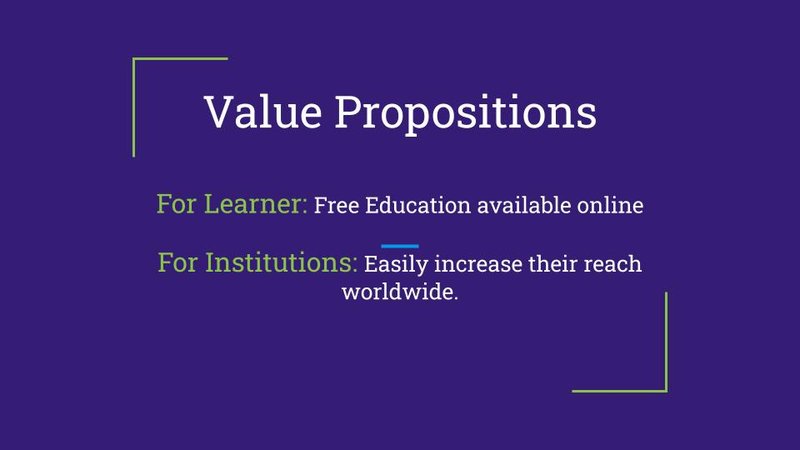
- This platform's value proposition is that it offers beneficial learning materials online for little to no money. It makes high-level education programs available to people of various backgrounds, which may otherwise be inaccessible or out of reach for some. On the other hand, using this platform, educational institutions have the opportunity to respond to a larger number of viewers globally.
- The Coursera platform hosts hundreds of academic and professional courses, but they do not create them. It merely serves as a platform for colleges all around the world to make their educational offerings available to a wider range of people. The Key Activity of the app is simply to uphold a positive relationship with these educational bodies, whose institutions construct the courses.
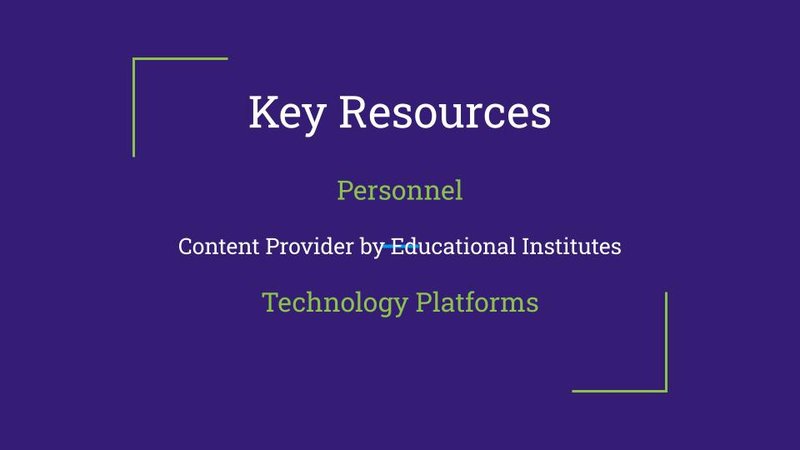
- Coursera is not reliant on any material assets. The platform's employees, sturdy platform, and collaboration with top educational institutions are its only Key Resources.
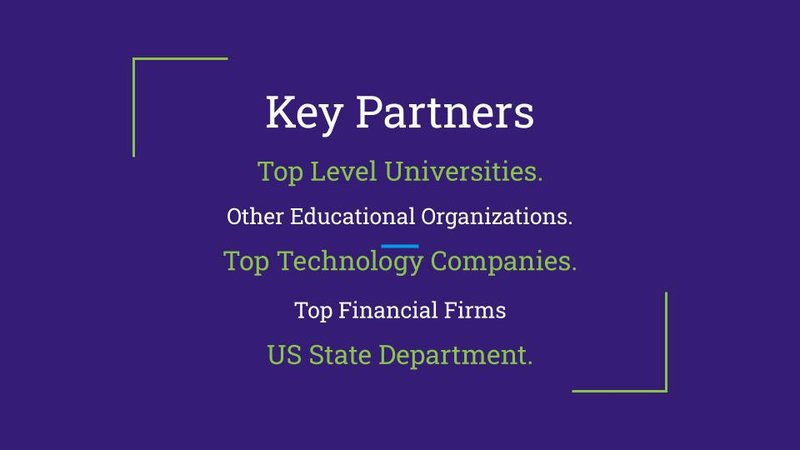
- In a similar vein, top-tier colleges and universities make up Coursera's Key Partners. It has such partners in more than 141 countries across 28 different continents. Recently, it also formed partnerships with several well-known financial institutions and corporate behemoths like Google to offer classes and raise the caliber of the content on the platform. Overall, the app's primary goal is to give users greater value.
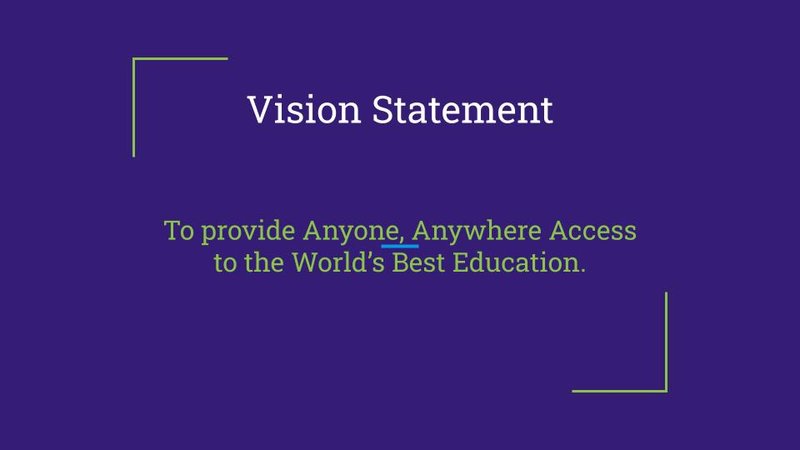
- Vision Statement: The core of Coursera's business strategy is a love for connecting with and serving the needs of students and those who want to further their professions and pursue their educational ambitions. It makes it possible for learners to locate and participate in flexible, high-quality learning that is job-relevant at reasonable costs, and occasionally even for free.
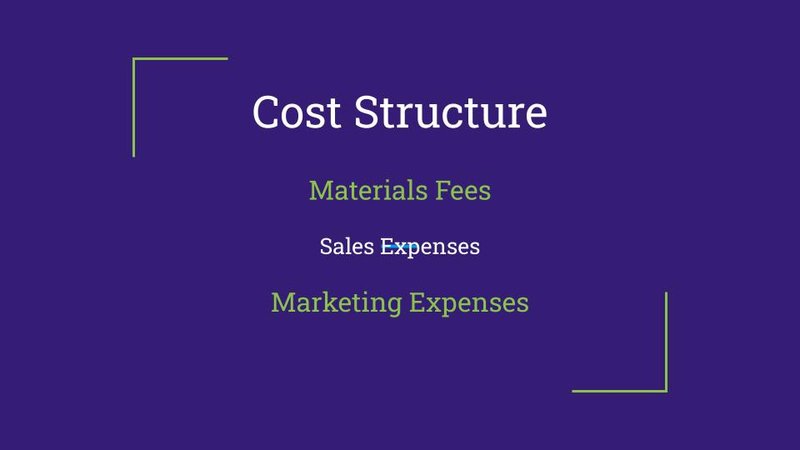
- Cost Structure: Supplying free branded content so that students can use it and develop their abilities. This free material draws users with a low CAC (Customer Acquisition Cost) Some of these students pay for their diplomas and degrees, which brings in money for the partners. The money they make encourages writers and content producers to produce more.
How Does the App Make Money With the Coursera Revenue Model?
The Coursera app employs numerous methods of revenue generation. Let's highlight each of them individually:
Coursera Plus:
The company started offering it as a monthly subscription service in 2020. The approximately 3000 courses, specialties, projects, and certifications are all accessible to customers after they purchase this subscription. The cost is $49 monthly or $399 annually.
Degree Programs:
Through this app, students can also obtain degrees from renowned colleges all over the world. To obtain credentials, they can study and perform tasks online. Through its collaboration with schools and institutions around the world, it offers a wide variety of Master's and Bachelor's degrees. The cost of these programs ranges from $8,000 to $25,000 in total.
For Businesses:
Business clients and corporations are the primary customers of Coursera's revenue stream. It offers to provide large company employees with the abilities they are lacking or want to develop. Numerous Fortune 500 firms are reportedly adopting Coursera for Business to keep their staff members current and skilled.
For Government:
Even some large international governmental institutions, such as the AIFC Bureau and UNDP, use Coursera to train their personnel.
Master Track Certificates:
These courses, which typically form a part of Master's degree programs, cost between $2,000 and $5,000. With the help of this service, students can obtain credentials from recognized universities online for a much lower price.
Three Things to Take Away from Coursera's Success
Entrepreneurs can take away several lessons from Coursera's success. The most significant lessons are listed here.
To create an app, you don't always need an original concept:
There were several well-known online education apps on the market when Coursera was first introduced. Actually, the founders of Udacity, two Stanford professors named Sebastian Thurn and Peter Norvig, were the ones who gave Coursera its inspiration.
They were both the app's founders' coworkers at Coursera. While Coursera's first course was on Machine Learning, Udacity's first course was about Artificial Intelligence (AI) (ML).
Today's market gives each app its own place and importance.
Scalability comes from combining powerful business models:
The Coursera app relies on a variety of revenue sources to be profitable. It uses a variety of business models, including a business-to-business revenue model, a marketplace business model, a SAAS business model, and a freemium business model. This tactic trains aspiring business owners to think creatively and take every possible measure to create value and maintain profitability.
Not always following the plan is important:
Initially created with a utopian goal in mind, the Coursera app. That indicates that at the time the app was launched, they had no intention of making any money from it.
However, the team was eventually able to charge for their services after gaining significant global traction.
The app's initial concept, which was built on providing open access to education for everyone and fostering strong communities through MOOCs, was also dropped from its business model following monetization.
Conclusion
So there you have it—a motivating success tale for the Coursera app. Essentially, it is a platform that was founded with the intention of producing Massive Open Online Courses, but in recent years, the corporation has shifted its emphasis to revenue and begun to provide prestigious short-course certificates. Contact Decodermind's skilled developers if you have any similar creative ideas for internet startups. We can assist you in making your dream a reality.
Decodermind Expertise: Why Choose Us?
Decodermind provides a wide range of services, from dynamic mobile app development to personalized corporate solutions and cutting-edge web development. Catering to a diverse clientele across various niches and sizes, we have extended our services to clients in the USA, UK, and Europe.
Decodermind is ready to be your trusted partner on this technological journey, whether you are a startup looking for a disruptive app, an established corporation aiming for digital transformation, or a firm in need of bespoke solutions. Our diverse approach, founded on creativity and technical competence, is adapted to the specific needs of your digital ambitions.
We welcome your ideas, questions, and participation. Your ideas inspire our never-ending quest for innovation. Share your thoughts, inquire about our services, or find us on social media. The future of digital innovation in the United Kingdom is not just a story we tell; it is a narrative we co-create. Join us in shaping the next chapter in the technological growth of the United Kingdom. Explore, interact, and embark on a digital transformation journey with Decodermind

 Hamid Salman
Hamid Salman